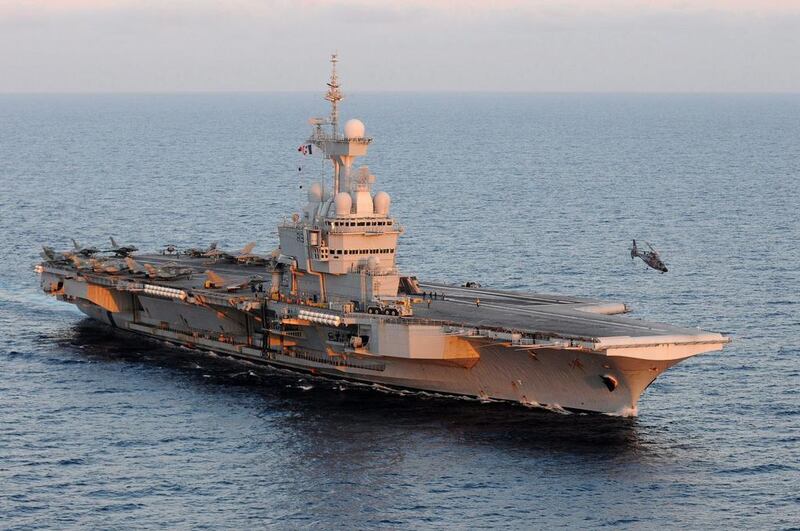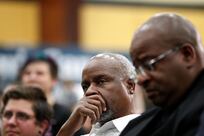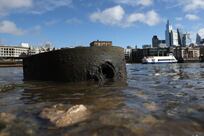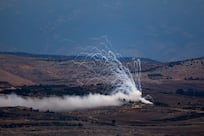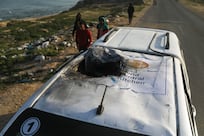As the French aircraft carrier Charles de Gaulle goes into action in the eastern Mediterranean, its crew armed with the unanimously adopted UN Resolution 2249 and itching to exact retribution for the attacks on Paris, one might fondly imagine that the leadership of ISIL is quaking in its boots.
But that would be over-optimistic. The latest figures from US Central Command, released this month, show that since Operation Inherent Resolve began in September last year the US-led coalition had made 5,432 air strikes in Iraq and 2,857 in Syria.
The list of destroyed targets includes 129 tanks, 357 personnel vehicles, 4,517 buildings and 4,942 fighting positions.
Yet ISIL remains in business, capable not only of imposing its savage will in the parts of Iraq and Syria it controls, but also of murdering civilians in France, Turkey, Lebanon, Yemen, Tunisia and Egypt.
France already has 18 aircraft at work in the region, operating out of bases in Jordan and the UAE. The Charles de Gaulle brings the total to 44.
Will a few more missions every day tip the balance? Highly unlikely.
Will the attacks and the inevitable toll of civilian casualties act as a recruiting agent for yet more deluded and disillusioned young European Muslims? Highly likely, believes Julian Lewis, chairman of the UK parliament’s defence committee and a senior MP in David Cameron’s ruling Conservative party.
The UK, which has been hitting ISIL targets in Iraq, is now under growing pressure to extend operations to Syria. Doing so, Mr Lewis told the BBC on Saturday, would be “futile and extremely dangerous … unless it is done in support of … credible ground forces”.
The cost and consequences of intervention in Afghanistan and Iraq have proved so catastrophic that no western government is likely to contemplate getting sand in its soldiers’ boots again for a generation or more.
Furthermore, as Gen Joseph F Dunford, chairman of the US Joint Chiefs of Staff, said in Washington on Tuesday, “a large western force” in the region “would be a rallying cry to jihad”.
It would also pander to the fundamentalist ideology of an organisation whose ultimate goal is to provoke an apocalyptic showdown with the “infidel horde” from the West in the vicinity of the Syrian town of Dabiq.
So what it to be done? Egyptian president Abdel Fattah El Sisi came close to spelling it out during a televised address in February. “The need for a unified Arab force,” he said, “has become more pressing with each day because of the huge challenges facing this region.”
Gen Dunford also said last week that: “We would like to see Sunni forces – particularly the [GCC] states, to contribute to a greater degree on the ground.
“I think they would have the credibility and come, frankly, without the baggage of western forces ... We haven’t been able to [make that happen] to date, but I think it is something we need to work on.”
One can argue about who created the beast: certainly the West bears great responsibility for the mistakes of the US-led invasion of Iraq in 2003 and for its failure to respond adequately to Bashar Al Assad’s crossed “red lines” in 2013, but ultimately would the problems created by ISIL be better dealt with by the Arab world?
The vast majority of ISIL’s victims are Muslims. Everything ISIL stands for tarnishes the reputation of Islam, which, to the dismay of Muslims everywhere, is in the process of becoming a synonym for evil for many in the West.
Not counting reserves, the six GCC states alone could muster a force over 400,000 strong, backed by more than 400 attack aircraft and 2,500 tanks. Recruit Egypt, Iraq and Jordan, and ISIL would be facing a million well-armed, well-trained and well-motivated troops.
The Gulf states have the tools for the job. Thanks to the vision of the leadership, the UAE’s soldiers are some of the best trained and equipped in the world. None could doubt their ability to get the job done – or their courage, as the recent sacrifices in Yemen have shown. The bravery of the UAE pilots taking part in Operation Inherent Resolve can also not be overstated.
As was clear from the unanimous UN vote, the permanent members of the Security Council would readily upgrade Resolution 2249 to an invocation of chapter seven of the UN charter, which would provide the legal basis for all-out, on-the-ground military action against ISIL. While hope is still attached to the recent Vienna talks to establish the right framework for a political solution to the Syrian crisis, the answer to the extremist threat may be found away from the negotiating table.
In July, the UAE launched the Sawab Centre, an initiative designed to “make a start in reclaiming the online space from extremists”.
Certainly the Arab world should lead the way in constructing the many strands of the counter-narrative against ISIL, but it should do so while recognising that the extremists will not be beaten without military intervention. Neither will the extremists be defeated by an army sourced from one part of the world.
On the contrary, ISIL has to be taken on and overcome by a world that stands together in defiance of the toxic words and deeds of extremists.
Jonathan Gornall is a freelance journalist in the UK
